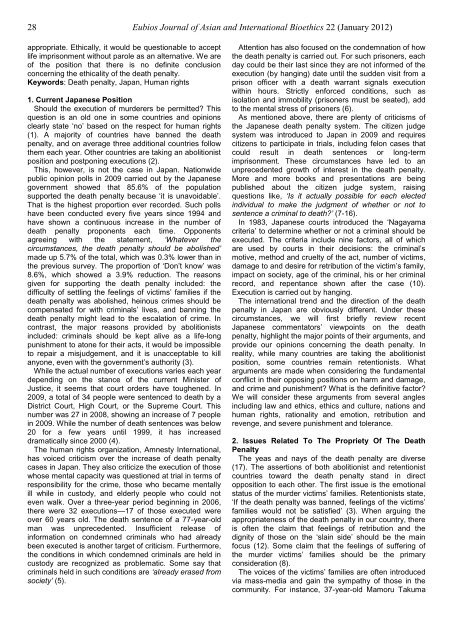Eubios Journal of Asian and International Bioethics - Eubios Ethics ...
Eubios Journal of Asian and International Bioethics - Eubios Ethics ...
Eubios Journal of Asian and International Bioethics - Eubios Ethics ...
You also want an ePaper? Increase the reach of your titles
YUMPU automatically turns print PDFs into web optimized ePapers that Google loves.
28 <strong>Eubios</strong> <strong>Journal</strong> <strong>of</strong> <strong>Asian</strong> <strong>and</strong> <strong>International</strong> <strong>Bioethics</strong> 22 (January 2012)<br />
appropriate. Ethically, it would be questionable to accept<br />
life imprisonment without parole as an alternative. We are<br />
<strong>of</strong> the position that there is no definite conclusion<br />
concerning the ethicality <strong>of</strong> the death penalty.<br />
Keywords: Death penalty, Japan, Human rights<br />
1. Current Japanese Position<br />
Should the execution <strong>of</strong> murderers be permitted? This<br />
question is an old one in some countries <strong>and</strong> opinions<br />
clearly state ‘no’ based on the respect for human rights<br />
(1). A majority <strong>of</strong> countries have banned the death<br />
penalty, <strong>and</strong> on average three additional countries follow<br />
them each year. Other countries are taking an abolitionist<br />
position <strong>and</strong> postponing executions (2).<br />
This, however, is not the case in Japan. Nationwide<br />
public opinion polls in 2009 carried out by the Japanese<br />
government showed that 85.6% <strong>of</strong> the population<br />
supported the death penalty because ‘it is unavoidable’.<br />
That is the highest proportion ever recorded. Such polls<br />
have been conducted every five years since 1994 <strong>and</strong><br />
have shown a continuous increase in the number <strong>of</strong><br />
death penalty proponents each time. Opponents<br />
agreeing with the statement, ‘Whatever the<br />
circumstances, the death penalty should be abolished’<br />
made up 5.7% <strong>of</strong> the total, which was 0.3% lower than in<br />
the previous survey. The proportion <strong>of</strong> ‘Don’t know’ was<br />
8.6%, which showed a 3.9% reduction. The reasons<br />
given for supporting the death penalty included: the<br />
difficulty <strong>of</strong> settling the feelings <strong>of</strong> victims’ families if the<br />
death penalty was abolished, heinous crimes should be<br />
compensated for with criminals’ lives, <strong>and</strong> banning the<br />
death penalty might lead to the escalation <strong>of</strong> crime. In<br />
contrast, the major reasons provided by abolitionists<br />
included: criminals should be kept alive as a life-long<br />
punishment to atone for their acts, it would be impossible<br />
to repair a misjudgement, <strong>and</strong> it is unacceptable to kill<br />
anyone, even with the government’s authority (3).<br />
While the actual number <strong>of</strong> executions varies each year<br />
depending on the stance <strong>of</strong> the current Minister <strong>of</strong><br />
Justice, it seems that court orders have toughened. In<br />
2009, a total <strong>of</strong> 34 people were sentenced to death by a<br />
District Court, High Court, or the Supreme Court. This<br />
number was 27 in 2008, showing an increase <strong>of</strong> 7 people<br />
in 2009. While the number <strong>of</strong> death sentences was below<br />
20 for a few years until 1999, it has increased<br />
dramatically since 2000 (4).<br />
The human rights organization, Amnesty <strong>International</strong>,<br />
has voiced criticism over the increase <strong>of</strong> death penalty<br />
cases in Japan. They also criticize the execution <strong>of</strong> those<br />
whose mental capacity was questioned at trial in terms <strong>of</strong><br />
responsibility for the crime, those who became mentally<br />
ill while in custody, <strong>and</strong> elderly people who could not<br />
even walk. Over a three-year period beginning in 2006,<br />
there were 32 executions—17 <strong>of</strong> those executed were<br />
over 60 years old. The death sentence <strong>of</strong> a 77-year-old<br />
man was unprecedented. Insufficient release <strong>of</strong><br />
information on condemned criminals who had already<br />
been executed is another target <strong>of</strong> criticism. Furthermore,<br />
the conditions in which condemned criminals are held in<br />
custody are recognized as problematic. Some say that<br />
criminals held in such conditions are ‘already erased from<br />
society’ (5).<br />
Attention has also focused on the condemnation <strong>of</strong> how<br />
the death penalty is carried out. For such prisoners, each<br />
day could be their last since they are not informed <strong>of</strong> the<br />
execution (by hanging) date until the sudden visit from a<br />
prison <strong>of</strong>ficer with a death warrant signals execution<br />
within hours. Strictly enforced conditions, such as<br />
isolation <strong>and</strong> immobility (prisoners must be seated), add<br />
to the mental stress <strong>of</strong> prisoners (6).<br />
As mentioned above, there are plenty <strong>of</strong> criticisms <strong>of</strong><br />
the Japanese death penalty system. The citizen judge<br />
system was introduced to Japan in 2009 <strong>and</strong> requires<br />
citizens to participate in trials, including felon cases that<br />
could result in death sentences or long-term<br />
imprisonment. These circumstances have led to an<br />
unprecedented growth <strong>of</strong> interest in the death penalty.<br />
More <strong>and</strong> more books <strong>and</strong> presentations are being<br />
published about the citizen judge system, raising<br />
questions like, ‘Is it actually possible for each elected<br />
individual to make the judgment <strong>of</strong> whether or not to<br />
sentence a criminal to death?’ (7-16).<br />
In 1983, Japanese courts introduced the ‘Nagayama<br />
criteria’ to determine whether or not a criminal should be<br />
executed. The criteria include nine factors, all <strong>of</strong> which<br />
are used by courts in their decisions: the criminal’s<br />
motive, method <strong>and</strong> cruelty <strong>of</strong> the act, number <strong>of</strong> victims,<br />
damage to <strong>and</strong> desire for retribution <strong>of</strong> the victim’s family,<br />
impact on society, age <strong>of</strong> the criminal, his or her criminal<br />
record, <strong>and</strong> repentance shown after the case (10).<br />
Execution is carried out by hanging.<br />
The international trend <strong>and</strong> the direction <strong>of</strong> the death<br />
penalty in Japan are obviously different. Under these<br />
circumstances, we will first briefly review recent<br />
Japanese commentators’ viewpoints on the death<br />
penalty, highlight the major points <strong>of</strong> their arguments, <strong>and</strong><br />
provide our opinions concerning the death penalty. In<br />
reality, while many countries are taking the abolitionist<br />
position, some countries remain retentionists. What<br />
arguments are made when considering the fundamental<br />
conflict in their opposing positions on harm <strong>and</strong> damage,<br />
<strong>and</strong> crime <strong>and</strong> punishment? What is the definitive factor?<br />
We will consider these arguments from several angles<br />
including law <strong>and</strong> ethics, ethics <strong>and</strong> culture, nations <strong>and</strong><br />
human rights, rationality <strong>and</strong> emotion, retribution <strong>and</strong><br />
revenge, <strong>and</strong> severe punishment <strong>and</strong> tolerance.<br />
2. Issues Related To The Propriety Of The Death<br />
Penalty<br />
The yeas <strong>and</strong> nays <strong>of</strong> the death penalty are diverse<br />
(17). The assertions <strong>of</strong> both abolitionist <strong>and</strong> retentionist<br />
countries toward the death penalty st<strong>and</strong> in direct<br />
opposition to each other. The first issue is the emotional<br />
status <strong>of</strong> the murder victims’ families. Retentionists state,<br />
‘If the death penalty was banned, feelings <strong>of</strong> the victims’<br />
families would not be satisfied’ (3). When arguing the<br />
appropriateness <strong>of</strong> the death penalty in our country, there<br />
is <strong>of</strong>ten the claim that feelings <strong>of</strong> retribution <strong>and</strong> the<br />
dignity <strong>of</strong> those on the ‘slain side’ should be the main<br />
focus (12). Some claim that the feelings <strong>of</strong> suffering <strong>of</strong><br />
the murder victims’ families should be the primary<br />
consideration (8).<br />
The voices <strong>of</strong> the victims’ families are <strong>of</strong>ten introduced<br />
via mass-media <strong>and</strong> gain the sympathy <strong>of</strong> those in the<br />
community. For instance, 37-year-old Mamoru Takuma

















